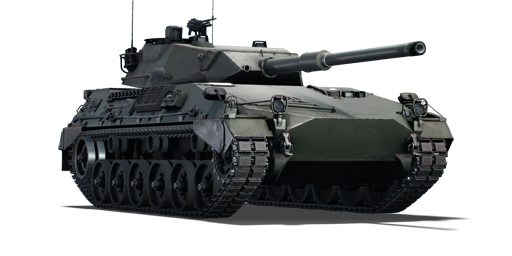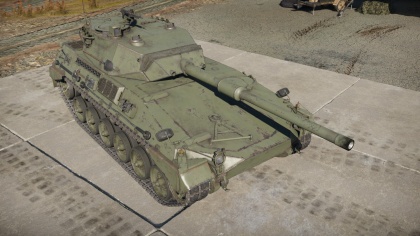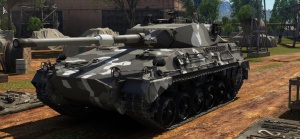Difference between revisions of "TAM"
(Edits.) |
Inceptor57 (talk | contribs) m |
||
| Line 172: | Line 172: | ||
* Faster and more manoeuvrable than the Begliatpanzer 57 | * Faster and more manoeuvrable than the Begliatpanzer 57 | ||
* It has all kind of shells for different situations or to destroy all kind of tanks | * It has all kind of shells for different situations or to destroy all kind of tanks | ||
| − | * Unlike other tanks the gun doesn't bounce at high speed | + | * Unlike other tanks, the gun doesn't bounce at high speed |
| − | * The mounted turret has great depression very good for shooting choppers and planes | + | * The mounted turret has great depression, very good for shooting choppers and planes |
* Little armour makes AP shots to pass through the tank without dealing much damage | * Little armour makes AP shots to pass through the tank without dealing much damage | ||
| − | * | + | * Very fast turret rotation and aiming |
* Turret is on the back, won't need to expose all the tank to shoot from cover | * Turret is on the back, won't need to expose all the tank to shoot from cover | ||
* First ammo rack has more than enough shells for a battle | * First ammo rack has more than enough shells for a battle | ||
| Line 186: | Line 186: | ||
* Impossible to depress the gun when facing backwards | * Impossible to depress the gun when facing backwards | ||
* Hard stock grind | * Hard stock grind | ||
| − | * Turret is on the back at some situations you will have to expose the whole tank to shoot | + | * Turret is on the back, at some situations you will have to expose the whole tank to shoot |
* Unlike other German tanks doesn't have a great zoom (just x8.00) | * Unlike other German tanks doesn't have a great zoom (just x8.00) | ||
== History == | == History == | ||
<!--''Describe the history of the creation and combat usage of the ground vehicle in more detail than in the introduction. If the historical reference turns out to be too big, take it to a separate article, taking a link to an article about the vehicle and adding a block "/ History" (example: <nowiki>https://wiki.warthunder.com/(Vehicle-name)/History</nowiki>) and add a link to it here using the <code>main</code> template. Be sure to reference text and sources by using <code><nowiki><ref></nowiki></code>, as well as adding them at the end of the article.''--> | <!--''Describe the history of the creation and combat usage of the ground vehicle in more detail than in the introduction. If the historical reference turns out to be too big, take it to a separate article, taking a link to an article about the vehicle and adding a block "/ History" (example: <nowiki>https://wiki.warthunder.com/(Vehicle-name)/History</nowiki>) and add a link to it here using the <code>main</code> template. Be sure to reference text and sources by using <code><nowiki><ref></nowiki></code>, as well as adding them at the end of the article.''--> | ||
| − | During the 1960s, Argentina was looking far and wide for offers to update | + | During the 1960s, Argentina was looking far and wide for offers to update their aging fleet of WW2-era tanks. After obtaining some vehicles, the U.S. refused to make further vehicle sales. This forced Argentina to shift their attention towards the European market, resulting in the purchase of a number of French AMX-13s and its variants. |
| − | In 1973 however, the Ministry of Defense drew up a set of requirements for a completely new combat vehicle that would be produced domestically and would to enter service by 1980. Despite knowing what they wanted, Argentinian engineers lacked the technical know-how in order to actually design and produce such a vehicle. Faced with this problem, the Argentinian government | + | In 1973 however, the Ministry of Defense drew up a set of requirements for a completely new combat vehicle that would be produced domestically and would to enter service by 1980. Despite knowing what they wanted, Argentinian engineers lacked the technical know-how in order to actually design and produce such a vehicle. Faced with this problem, the Argentinian government seeked a collaboration with a foreign company in order to design and build the vehicle they wanted. Eventually, a contracted was signed with the German Thyssen-Henschel company, a joint development effort soon ensued. |
The TAM (Tanque Argentino Mediano, eng: Argentinian Medium Tank), as it would be designated, was based off the German Marder IFV and equipped with a modification of the British, the Royal Ordnance L7A3 cannon that was produced in Germany. The first two prototypes of the TAM were built in 1976 and 1977 respectively and underwent extensive testing over the course of two years. | The TAM (Tanque Argentino Mediano, eng: Argentinian Medium Tank), as it would be designated, was based off the German Marder IFV and equipped with a modification of the British, the Royal Ordnance L7A3 cannon that was produced in Germany. The first two prototypes of the TAM were built in 1976 and 1977 respectively and underwent extensive testing over the course of two years. | ||
| − | After successfully passing testing, the TAM was put into mass production in 1979. The vehicles were armed with FMK.4 Modelo 1L cannons, which was a domestic licensed copy of the original German cannon. The government ordered 200 vehicles of the IFV variant. However, economic difficulties resulted in the order being only partially fulfilled before production was restarted later on. Argentina was also very keen on exporting the TAM to other countries, but despite interest and some contracts being signed, the TAM was never widely exported for various reasons. | + | After successfully passing testing, the TAM was put into mass production in 1979. The vehicles were armed with FMK.4 Modelo 1L cannons, which was a domestic licensed copy of the original German cannon. The government ordered 200 vehicles of the IFV variant. However, economic difficulties resulted in the order being only partially fulfilled, before production was restarted later on. Argentina was also very keen on exporting the TAM to other countries, but despite interest and some contracts being signed, the TAM was never widely exported for various reasons. |
A total of around 280 TAMs were built and most of them still serve in the Argentinian army, albeit with upgraded equipment. The TAM was never deployed in any combat operations to this date. | A total of around 280 TAMs were built and most of them still serve in the Argentinian army, albeit with upgraded equipment. The TAM was never deployed in any combat operations to this date. | ||
Revision as of 20:05, 30 March 2019
Contents
Description
The Tanque Argentino Mediano (shortened to TAM, English translated as: Argentine Medium Tank) is a rank VI German light tanks
with a battle rating of 9.0 (AB/RB/SB). It was introduced in Update 1.81 "The Valkyries".
General info
Survivability and armour
The armour is composed of welded steel, providing protection up to 32 mm.
The front can defend against 12.7 mm machine gun ammo, but the side armour is only proof against standard machine guns of 7.62 mm. However, most enemies that can be faced will usually have a 12.7 mm machine gun or larger in their possession, making it so even a burst of bullets could riddle the TAM with holes.
The TAM also is hull-breakable, and so rounds that hit have a chance of instantly destroying the vehicle.
Mobility
Mobility is not bad, with a max of 70 km/h on the road in both forward and reverse. Off road mobility is quite average, especially on flat terrain, but there is a poor steering response.
Armaments
Main armament
| 105 mm FMK.4 Modelo 1L | |||||
|---|---|---|---|---|---|
| Capacity | Vertical guidance |
Horizontal guidance |
Stabilizer | ||
| 50 | -7°/+18° | ±180° | Two-plane | ||
| Turret rotation speed (°/s) | |||||
| Mode | Stock | Upgraded | Prior + Full crew | Prior + Expert qualif. | Prior + Ace qualif. |
| Arcade | 22.8 | __.__ | __.__ | __.__ | __.__ |
| Realistic | 14.28 | __.__ | __.__ | __.__ | __.__ |
| Reloading rate (seconds) | |||||
| Stock | Prior + Full crew | Prior + Expert qualif. | Prior + Ace qualif. | ||
| 8.7 | __.__ | __.__ | 6.7 | ||
Ammunition
| Penetration statistics | |||||||
|---|---|---|---|---|---|---|---|
| Ammunition | Type of warhead |
Penetration in mm @ 0° Angle of Attack | |||||
| 10m | 100m | 500m | 1000m | 1500m | 2000m | ||
| DM13 | APDS | 303 | 302 | 296 | 277 | 257 | 252 |
| DM502 | HESH | 127 | 127 | 127 | 127 | 127 | 127 |
| DM12 | HEATFS | 400 | 400 | 400 | 400 | 400 | 400 |
| DM23 | APFSDS | 337 | 335 | 330 | 322 | 314 | 306 |
| Shell details | ||||||||||
|---|---|---|---|---|---|---|---|---|---|---|
| Ammunition | Type of warhead |
Velocity in m/s |
Projectile Mass in kg |
Fuse delay
in m: |
Fuse sensitivity
in mm: |
Explosive Mass in g (TNT equivalent): |
Normalization At 30° from horizontal: |
Ricochet: | ||
| 0% | 50% | 100% | ||||||||
| DM13 | APDS | 1,478 | 4 | N/A | N/A | N/A | +1.5° | 75° | 78° | 80° |
| DM502 | HESH | 730 | 15 | 0.4 | 0.1 | 4,310 | +0° | 73° | 77° | 80° |
| DM12 | HEATFS | 1,173 | 11 | 0.0 | 0.1 | 1,270 | +0° | 65° | 72° | 75° |
| DM23 | APFSDS | 1,455 | 3.8 | N/A | N/A | N/A | ? | 76° | 77° | 78° |
| Smoke characteristic | ||||||
|---|---|---|---|---|---|---|
| Ammunition | Velocity in m/s |
Projectile Mass in kg |
Screen radius in m |
Screen time in s |
Screen hold time in s: |
Explosive Mass in g (TNT equivalent): |
| M416 | 730 | 11.4 | 20 | 5 | 25 | 50 |
Machine guns
The TAM is equipped with two machine guns with a total of 4,000 rounds.
| 7.62 mm FN MAG 60-40 | ||||||
|---|---|---|---|---|---|---|
| Coaxial mount | ||||||
| Capacity (Belt capacity) | Fire rate (shots/minute) |
Vertical guidance |
Horizontal guidance | |||
| 2,000 (200) | 600 | N/A | N/A | |||
| Pintle mount | ||||||
| Capacity (Belt capacity) | Fire rate (shots/minute) |
Vertical guidance |
Horizontal guidance | |||
| 2,000 (200) | 60 | -__°/+__° | ±__° | |||
Usage in battles
The TAM could be played as an assassin, scout, or as a support vehicle on the battlefield. This variety of role is capable due to the powerful 105 mm cannon with an ammunition variety akin to the Leopard A1A1, at the same time the thin armour prohibits any head-on combat which encourages fighting behind the front lines or from the flanks. Keep an eye out as any enemy that can be faced will be able to destroy the TAM if they so much as get a bead on with their armaments.
The best way to use the TAM is exploit the scouting ability to mark enemies on the map, then call in friendlies to do the heavy fighting against them. While the team keeps the enemy busy, take pot shots with the 105 mm to also pick off the enemy as their attention is diverted from the TAM.
Pros and cons
Pros:
- Decent firepower
- Faster and more manoeuvrable than the Begliatpanzer 57
- It has all kind of shells for different situations or to destroy all kind of tanks
- Unlike other tanks, the gun doesn't bounce at high speed
- The mounted turret has great depression, very good for shooting choppers and planes
- Little armour makes AP shots to pass through the tank without dealing much damage
- Very fast turret rotation and aiming
- Turret is on the back, won't need to expose all the tank to shoot from cover
- First ammo rack has more than enough shells for a battle
- Cheap repair cost
Cons:
- Very thin armour providing little to no protection
- Ammunition price is quite high (APFSDS shells are 1300 SL)
- Impossible to depress the gun when facing backwards
- Hard stock grind
- Turret is on the back, at some situations you will have to expose the whole tank to shoot
- Unlike other German tanks doesn't have a great zoom (just x8.00)
History
During the 1960s, Argentina was looking far and wide for offers to update their aging fleet of WW2-era tanks. After obtaining some vehicles, the U.S. refused to make further vehicle sales. This forced Argentina to shift their attention towards the European market, resulting in the purchase of a number of French AMX-13s and its variants.
In 1973 however, the Ministry of Defense drew up a set of requirements for a completely new combat vehicle that would be produced domestically and would to enter service by 1980. Despite knowing what they wanted, Argentinian engineers lacked the technical know-how in order to actually design and produce such a vehicle. Faced with this problem, the Argentinian government seeked a collaboration with a foreign company in order to design and build the vehicle they wanted. Eventually, a contracted was signed with the German Thyssen-Henschel company, a joint development effort soon ensued.
The TAM (Tanque Argentino Mediano, eng: Argentinian Medium Tank), as it would be designated, was based off the German Marder IFV and equipped with a modification of the British, the Royal Ordnance L7A3 cannon that was produced in Germany. The first two prototypes of the TAM were built in 1976 and 1977 respectively and underwent extensive testing over the course of two years.
After successfully passing testing, the TAM was put into mass production in 1979. The vehicles were armed with FMK.4 Modelo 1L cannons, which was a domestic licensed copy of the original German cannon. The government ordered 200 vehicles of the IFV variant. However, economic difficulties resulted in the order being only partially fulfilled, before production was restarted later on. Argentina was also very keen on exporting the TAM to other countries, but despite interest and some contracts being signed, the TAM was never widely exported for various reasons.
A total of around 280 TAMs were built and most of them still serve in the Argentinian army, albeit with upgraded equipment. The TAM was never deployed in any combat operations to this date.
- From Devblog
Media
See also
Links to the articles on the War Thunder Wiki that you think will be useful for the reader, for example:
- reference to the series of the vehicles;
- links to approximate analogues of other nations and research trees.
External links
| Germany light tanks | |
|---|---|
| Pz.II | Pz.II C · Pz.II C (DAK) · Pz.II C TD · Pz.II F · Pz.Sfl.Ic |
| Sd.Kfz.234 | Sd.Kfz.234/1 · Sd.Kfz.234/2 · Sd.Kfz.234/2 TD |
| Marder | Marder A1- · Marder 1A3 · Begleitpanzer 57 · DF105 |
| SPz PUMA | PUMA · PUMA VJTF |
| Wheeled | Sd.Kfz.221 (s.Pz.B.41) · Class 3 (P) · Radkampfwagen 90 · Boxer MGS |
| Other | Ru 251 · SPz 12-3 LGS |
| Argentina | TAM · TAM 2C · TAM 2IP · JaPz.K A2 |
| Czechoslovakia | Pz.35(t) · Pz.38(t) A · Pz.38(t) F · Pz.38(t) n.A. · Sd.Kfz. 140/1 |
| France | Pz.Sp.Wg.P204(f) KwK |
| Lithuania | Vilkas |
| USA | leKPz M41 |
| USSR | SPz BMP-1 |






